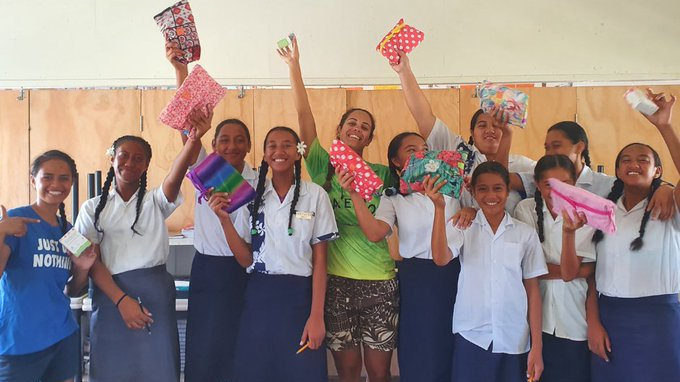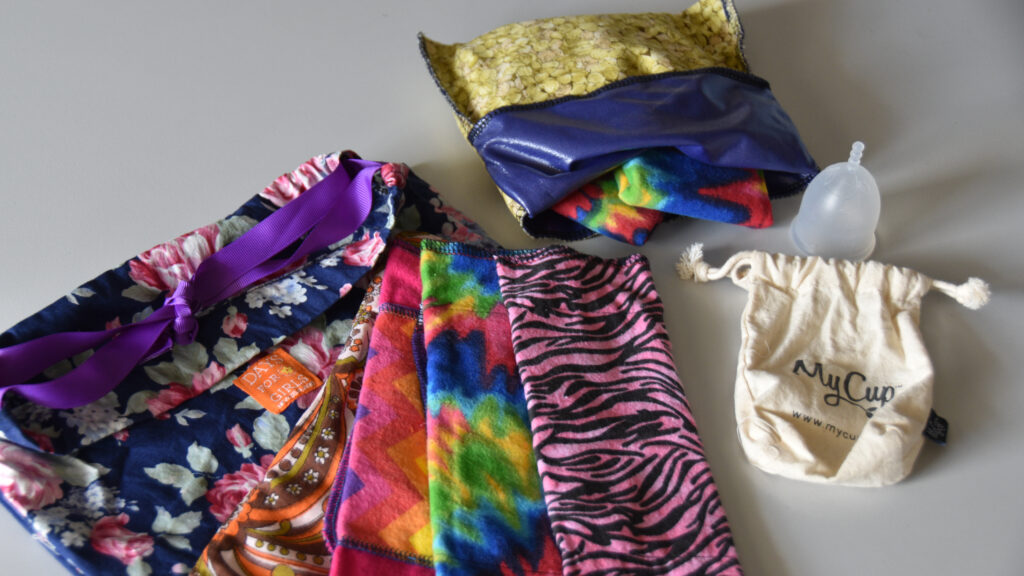Society receives $22k from United Nations for support
Saturday 18 December 2021 | Written by Sian Solomon | Published in Health, National

Students involved in Maine Mura: Girls with Dignity project holding their reusable menstrual products. Photo: UN Women. 21121623
Te Ipukarea Society has received a grant of $22,000 from the United Nations in the Pacific to help support women living in the Cook Islands who struggle with period poverty.
Period poverty is the inadequate access to safe and hygienic menstrual tools and education, which include but are not limited to sanitary products, washing facilities, and waste management options.
According to Te Ipukarea Society’s senior project manager, Alanna Smith, it was luck that the organisation found out about the grant which she said was an honour to receive for the first time.
“We were lucky we got passed the application from the Cook Islands Family and Welfare Association, who had shared it amongst their networks,” Smith said.
“It was just a small grant that we applied for last year, and it was the first time we had ever gone through the United Nations (UN) women.
“So it was really neat to be successful and get this grant for the first time.”
According to Smith, to be successful for the funding Te Ipukarea Society’s application had to include how to reduce discrimination in females during Covid-19.
She said the group achieved this by combining it with an environmental perspective.

“This was kind of different because we needed a women’s component to it, and it was trying to reduce discrimination in women for schools.
“This was by making products more accessible through reusable alternative solutions that our young women and females maybe haven’t heard of before.
“So we were able to tie that in with our environmental perspective, being that some girls don’t go to school because they have their periods, and they might not have the products to manage this.”
To help close the period poverty gap in the Cook Islands, the Society initiated a series of workshops around the country earlier this year called Maine Mura: Girls with Dignity.
The aim of the workshops was to help alleviate some of the pressure associated with period poverty while promoting sustainable ways to manage periods and reduce waste.
Two community workshops were held on each of the outer islands, with one being school-focused involving awareness-raising campaigns and talking about moon cups and reusable pads.
The other workshop was focused on the wider community and older women.
Throughout both campaigns, Smith said that they felt it was safer to have the workshops split because talk of periods is often considered taboo.
“We thought it would be worthwhile to have it split so that the younger girls would feel more comfortable to talk about these new things because I think it’s still very taboo here in the Cook Islands to talk about periods.
“So I think having it split worked really well.”
During the workshops, young girls and women received either a moon cup, which is a silicone bell that captures fluid and can be reused lasting 10 years, or a reusable pad kit, which comes with eight reusable pads and was provided by the United Nations.
People who participated in the workshops were able to take home the products, trial them and provide feedback.

Smith said there is still one more island and campaign that needs to be done.
“We’ve got one more island to do which is Rarotonga, and we have managed to secure funds through UNESCO so they will be funding the campaign which will be for all senior and high school students here on Rarotonga.
“These girls will be a bit luckier because we have learned quite a bit from the Pa Enua campaigns and have been introduced to period undies. This is a new product that we will be introducing and talking about a bit more for the Rarotonga schools.”
According to Smith, Te Ipukarea Society is currently working with a number of brands in New Zealand to trial the period undies and are waiting on instructions on how to use and look after them.
Once those trial products become available, the Society says it will select a number of women throughout the community to trial them and provide feedback.
Smith did not say when the product would be ready for trial.
A number of other Pacific island countries were also successful in receiving a grant from the United Nations but with different projects.














































